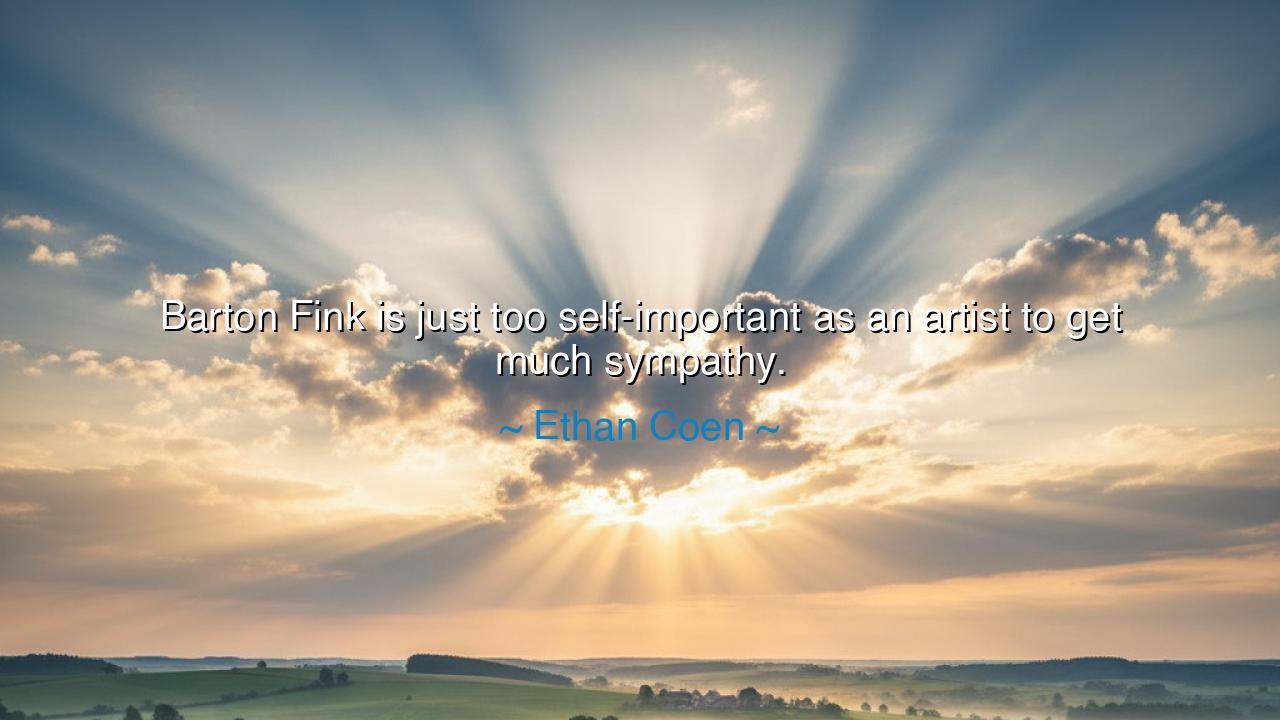
Barton Fink is just too self-important as an artist to get much






When Ethan Coen declared, “Barton Fink is just too self-important as an artist to get much sympathy,” he revealed a truth not only about one of his own creations, but about the human tendency to be consumed by pride in one’s own genius. In the figure of Barton Fink, the struggling screenwriter who believes himself the torchbearer of artistic truth, we see the tragic flaw of the artist who elevates himself so high above others that he becomes incapable of humility. Coen’s words cut through with clarity: when self-importance overshadows humanity, the audience’s sympathy fades.
The heart of the statement lies in the danger of arrogance disguised as artistry. Barton Fink claims to write “for the common man,” yet he rarely listens to the voices of those around him. He treats others as mirrors for his own self-image rather than as equals with their own stories. This dissonance between intention and behavior is what makes him difficult to embrace. As Coen reminds us, sympathy is not automatically given to those who call themselves artists—it is earned through vulnerability, honesty, and humility.
History is filled with figures who illustrate this same paradox. Consider the Greek myth of Narcissus, who became so enamored with his own reflection that he wasted away at the edge of the pool, unable to love another. His story is not merely about vanity of appearance, but vanity of spirit—the inability to see beyond oneself. Barton Fink is a modern Narcissus: too enamored with his vision of himself as a prophet of art to connect with the humanity that should be at the center of his craft. And like Narcissus, his fate is isolation rather than glory.
Coen’s words also remind us that sympathy is drawn not from perfection, but from the recognition of shared struggle. The artist who is flawed, broken, yet humble, can win our hearts. We weep for Van Gogh, who poured his suffering into beauty; we admire Dostoevsky, who bore exile and despair to write of the depths of the human soul. But the artist who proclaims his superiority, who presents himself as above the ordinary, often forfeits our compassion. In this, Coen exposes a hard truth: art without humility alienates, while art with humility connects.
The lesson, O seekers, is that self-importance is the enemy of sympathy. To believe in your art is noble, but to worship yourself through your art is folly. The true artist listens as much as he creates, honors the humanity of others as much as his own vision, and recognizes that his gift is not a crown to wear, but a lamp to hold for all. The world does not need prophets who sneer at the masses, but companions who walk with them, sharing their struggles through story, song, or image.
Practical action lies before you: if you create, create with courage, but also with humility. Do not close your ears to others in the certainty of your own brilliance. Ask yourself, not only what do I want to say, but what does the world need to hear? And when others offer critique or share their pain, receive it not as an obstacle, but as the soil in which your art may grow deeper. In this way, your work will not only display talent but foster connection, the true goal of art.
Therefore, let Coen’s words endure as a warning and a guide: the artist who is too self-important may gain recognition, but never love. Without humility, there can be no sympathy; without sympathy, art loses its power to move. Let your craft be a bridge, not a pedestal; let your voice be one among many, not above all. For in the end, it is not self-importance that preserves the artist, but the ability to touch the hearts of others with honesty and grace.






AAdministratorAdministrator
Welcome, honored guests. Please leave a comment, we will respond soon